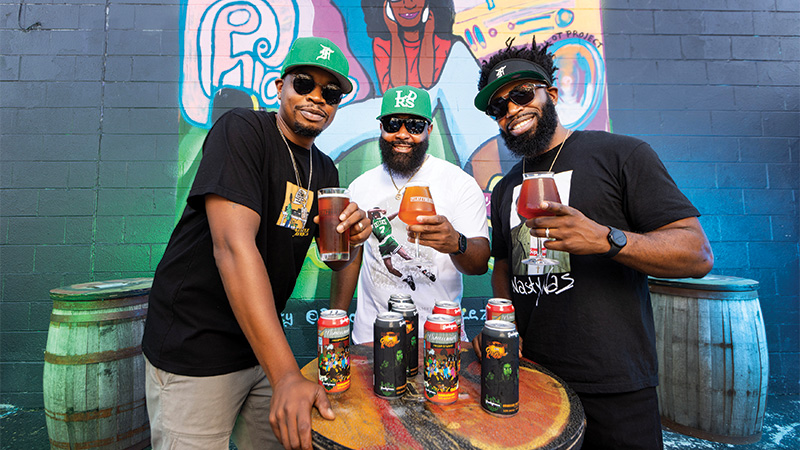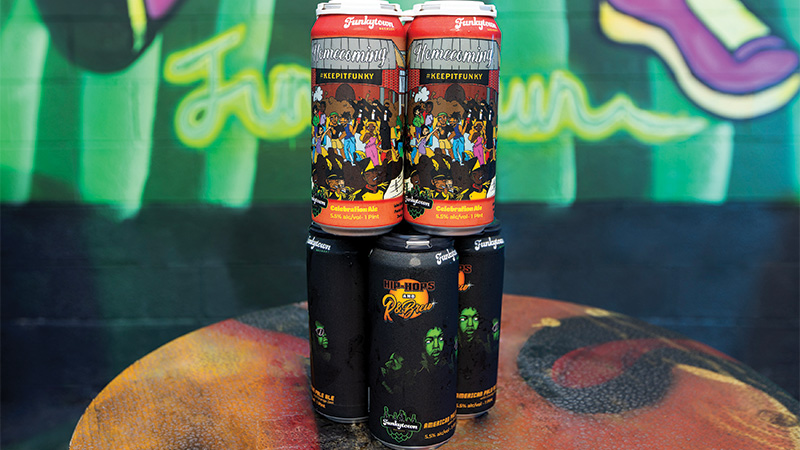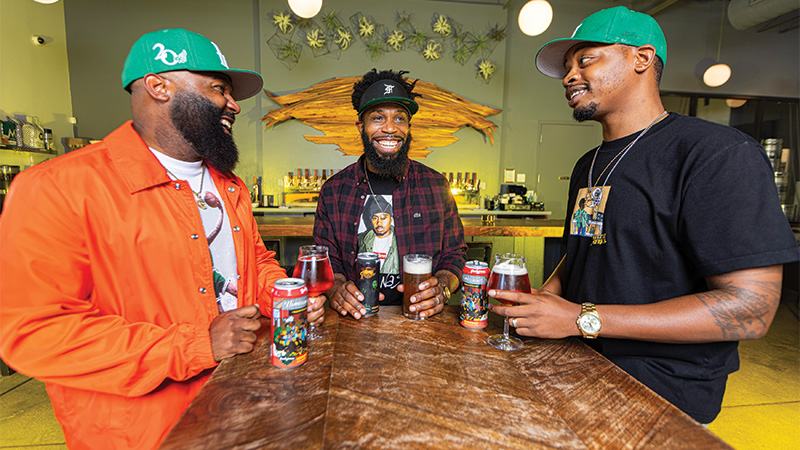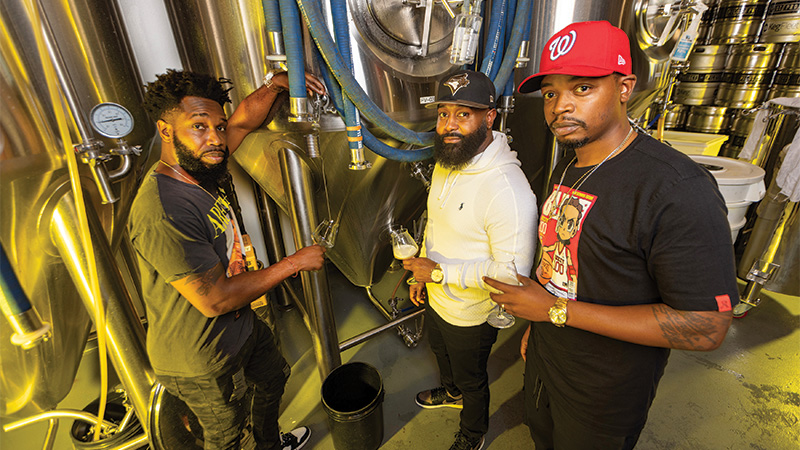This feature is part of our 2023 Next Wave Awards.
Rich Bloomfield, Greg Williams, and Zack Day were in seventh grade when they forged their lifelong friendship, bonding over their shared love for music that eventually became a shared love for beer.
Returning back to their home city of Chicago after graduating from Grambling State University, an HBCU in Louisiana, the trio gravitated toward beers that were mainly made from malt liquor. “Mickey’s Steel Reserve, Olde English,” Bloomfield explains. “Pretty much all of the stuff that was $1.70 or less.”
Don’t Miss A Drop
Get the latest in beer, wine, and cocktail culture sent straight to your inbox.

Living in Chicago during the craft beer boom, though, the three soon started experimenting with other beers, trying new styles and flavors, and learning the nuances between beer labels. But they realized they were the only ones in their friend group doing so.
“We would go out, to birthday parties or barbecues or whatever, and we would bring craft beer, but we were the only Black people there actually drinking it,” says Bloomfield. “All the other Black people, the women, the Hispanic people around us, they were kind of confused, but they were also curious.”
It was at this moment that the trio knew they had an opportunity to welcome a new group of drinkers to craft beer. Their first order of business? Actually talking to consumers to learn more about what they were looking for in a beer. They discovered that while the aromas of an IPA were appealing, many consumers actually found the taste to be too bitter, and preferred a pale ale or lager.

Armed with this knowledge, the three founded Funkytown Brewery in 2017. They started homebrewing out of Day’s parents’ Chicago garage with the intention of brewing palatable beers to reach spaces they believed existing craft breweries weren’t reaching. Early releases from their homebrewing days included a Citra pale ale brewed with Citra hops packaged in glass bottles that the founders sent out as samples to friends, family, and others in the local Chicago community. In July 2021, more samples of Funkytown’s home beer were distributed to those interested. By early August, they were completely out of stock.
But they were in luck production-wise. Just a few weeks after running out of samples, Funkytown secured the last remaining tank space at Pilot Project, a collaborative brewery incubator serving as a launch pad for start-up breweries, taking their home-based operation to the big leagues.
Since working with Pilot Project, Funkytown has been able to expand its production (from 80 barrels to 1,600 barrels across seven core styles and a handful of collaborations), starting with its flagship American pale ale, Hip-Hops and R&Brew — named for Bloomfield, Williams, and Day’s shared love of music — which plays with flavors like lychee, citrus, and strawberry. Additional releases while with Pilot Project have included easy drinking beers like the 5.4 percent ABV Irish red ale Cuffin’ Season; Woo-Wap-Da-Bam, an American amber ale with notes of toffee and peach; and many more. Since joining the project just over two years ago, the Funkytown founders have received mentorship and participated in seven collaborations, all while remaining true to their original vision of improving diversity within the brewing industry and giving back to their community.
And when it comes to improving diversity, intention is everything.

“If it’s a product for women, oftentimes it’s like, ‘Hey, we’ll do this for Women’s Month and we’ll put it in a pink can.’ That’s not intentional. That’s low-hanging fruit,” Day says. “We really wanted to make people feel like this particular beer belonged to them; it wasn’t just to pacify the group of people they belong to.”
From the ingredients used in the beer, to the art on the can, all the way down to who the beer will benefit and which organizations to give back to, every decision is intentional, and Funkytown credits its community engagement as the driving force behind its success. In the past, Funkytown has partnered with nonprofits like the Fame Center, the Network for Teaching Entrepreneurship, and the Gray Matter Experience, all of which seek to uplift kindergarten through college-aged students looking to expand their arts and entrepreneurship education, respectively.
This past summer, the brewery partnered with The Simple Good, a nonprofit focused on social emotional learning through arts-based education for K–12, raising over $40,000 for its summer arts program. Funkytown also participates in the yearly “Black Is Beautiful” initiative. This year, proceeds from its Black Is Beautiful Imperial Stout benefit Chi-Side, a nonprofit providing sports training for kids aged 9–18 in order to improve their public speaking, analytical skills, and build confidence.

Additionally, the three co-founders have worked tirelessly to uplift those in the brewing community who have historically been underrepresented. They’ve co-hosted events with Black and Brew Chicago, which advocates for a more welcoming, diverse, and equitable brewing industry; Opportunity Knocks, which focuses on supporting those with intellectual and physical disabilities; and the Black Professionals Network, which provides connections for Black professionals looking to build a legacy.
For its work supporting its local communities — and its flagship beer — Funkytown was awarded the Samuel Adams Brewing & Business Experienceship in June of this year. As a part of the Boston brewery’s “Brewing the American Dream” philanthropic initiative, the experienceship allows for the winning applicant to have access to both brewing and business resources from the team at Sam Adams, including one-on-one mentorship and the opportunity to collaborate on a specialty beer.
“I think one of the things coming from the Black community, really any underserved beer community, is that you don’t even know where to find the answers that can help you succeed because you’re so disconnected,” Bloomfield explains. “You’ve been implicitly left out, and we want to change that.”


